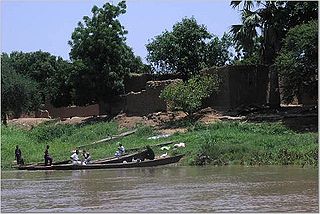A vertical vowel system is the system of vowels in a language that requires only vowel height to phonemically distinguish vowels. Theoretically, rounding, frontness and backness could also be used in one-dimensional vowel systems; however, vertical refers specifically to the usage of vowel height as the sole distinguishing feature.

The Australian Aboriginal languages consist of around 290–363 languages belonging to an estimated 28 language families and isolates, spoken by Aboriginal Australians of mainland Australia and a few nearby islands. The relationships between these languages are not clear at present. Despite this uncertainty, the Indigenous Australian languages are collectively covered by the technical term "Australian languages", or the "Australian family".

The Pama–Nyungan languages are the most widespread family of Australian Aboriginal languages, containing perhaps 300 languages. The name "Pama–Nyungan" is derived from the names of the two most widely separated groups, the Pama languages of the northeast and the Nyungan languages of the southwest. The words pama and nyunga mean "man" in their respective languages.
Over two billion people speak English, making English the largest language by number of speakers, and the third largest language by number of native speakers. The United Kingdom and the United States with 60 million and 230 million respectively, have the most native speakers. Additionally, there are 29 million in Canada, 24.1 million in Australia, 5 million in New Zealand, and 5 million in Ireland.

The Biu–Mandara or Central Chadic languages of the Afro-Asiatic family are spoken in Nigeria, Chad and Cameroon. The most widely spoken is Kamwe, with 300,000 speakers.

The Flinders River is the longest river in Queensland, Australia, at approximately 1,004 kilometres (624 mi). It was named in honour of the explorer Matthew Flinders. The catchment is sparsely populated and mostly undeveloped. The Flinders rises on the western slopes of the Great Dividing Range in North West Queensland and flows generally north-west through the Gulf Country, across a large, flat clay pan, before entering the Gulf of Carpentaria.

Aboriginal Australians is a western term for the people who are from the Australian mainland and many of its islands, such as Tasmania, Fraser Island, Hinchinbrook Island, the Tiwi Islands, and Groote Eylandt, but excluding the Torres Strait Islands.

Pan Africanist Youth Congress (PAYCO) is the youth wing of the Pan Africanist Congress (PAC) in South Africa.Eastern Cape Launched the first PAYCO Regional Congress under the RTT Leadership lead by Comrade Luvo Nkwenkwe.
Although Australia has no official language it is true English has been entrenched as the de facto national language since European settlement. Australian English is a major variety of the language with a distinctive pronunciation and lexicon, and differs slightly from other varieties of English in grammar and spelling. General Australian serves as the standard dialect.

Chari-Baguirmi is one of the 23 regions of Chad. Its capital is Massenya. It is composed of part of the former Chari-Baguirmi Prefecture and parts of the sub-prefecture of N'Djamena).

Mayo-Kebbi Est is one of the 23 regions of Chad. Its capital is Bongor. It is composed of the northern areas of the former prefecture of Mayo-Kebbi.

Australians, colloquially referred to as "Aussies", are people associated with the country of Australia, usually holding Australian citizenship.
Indigenous Australians are people with familial heritage to groups that lived in Australia before British colonisation. They include the Aboriginal and Torres Strait Islander peoples of Australia. The term Aboriginal and Torres Strait Islander people, or the person's specific cultural group, is often preferred, though the terms First Nations of Australia, First Peoples of Australia and First Australians are also increasingly common.
Mbara is an endangered Chadic (Biu–Mandara) language of Chad.
Mbara, and Yanga are mutually intelligible but separate Aboriginal language of Queensland, both now extinct. Glottolog assigns a code to a group level as Mbara-Yanga (mbar1254). Yanga is not to be confused with the Yangga language, a dialect of Biri.
The Mbara, also known as Kumbulmara, Mitjamba, Midjamba and Kumbulara, are or were an Aboriginal Australian people of the present-day state of Queensland. They spoke the Pama–Nyungan Mbara language.
The Yanga people, also spelt Jangaa, Janggal, Janga, and Yangaa, were an Aboriginal Australian people of the state of Queensland. They may be the same as the Yukulta/Ganggalida/Nyangga group. They are not to be confused with the Yangga.








